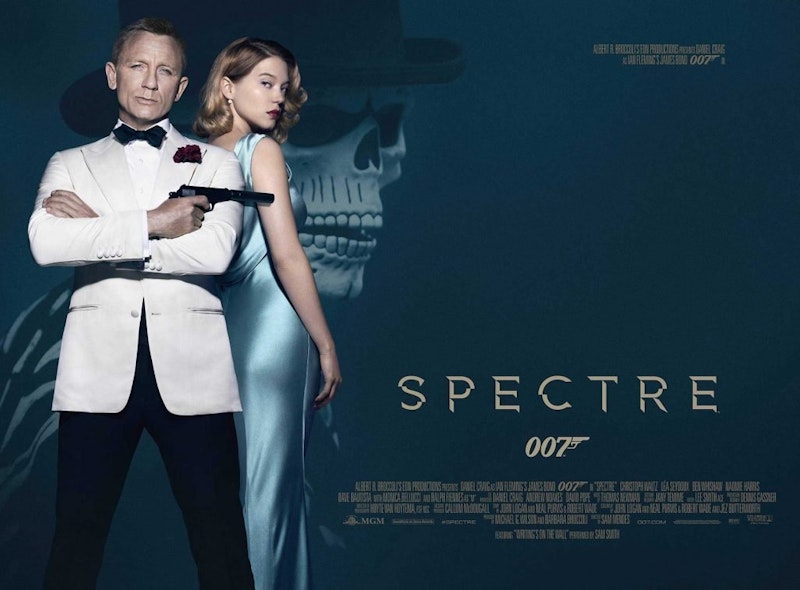There are a number of ways for James Bond movies to fail, but it’s surprising how many collapse in the second half. More often than you’d expect a Bond film has a first half that sets up a nice atmosphere and some promising plot points, but then as the story continues its logic fails. 2015’s Spectre is especially disappointing because the movie marks something of a landmark for Eon Productions. Eon had acquired all rights to Thunderball before making this film, which means the evil organization called SPECTRE (or, here, just Spectre) can be used in a Bond movie for the first time in decades. At least the overarching plot of Daniel Craig’s Bond gets to take another lurch forward.
Spectre begins in Mexico City during the Day of the Dead celebrations. Bond kills a bomber named Sciarra, who he learns worked for the mysterious organization called Quantum. But the mission wasn’t authorized by the current M (Ralph Fiennes), who’s upset with Bond for the splashy public battle; rather, the hit on Sciarra was a command from the old M (Judi Dench), prepared before her death in the last film. And there’s a further command, for Bond to go to Sciarra’s funeral.
You expect, at this early point, that more details will emerge about how M knew about Sciarra and why she didn’t leave notes for Bond. That never happens. Instead, as the current M engages in bureaucratic infighting with his new boss, Max Denbigh (Andrew Scott), who wants to form an international intelligence-gathering organization, Bond goes to Sciarra’s funeral and learns from his widow that the head of the secret society Sciarra belonged to is calling a major meeting of all their operatives.
Bond infiltrates the meeting, and finds that the boss has targeted one of the surviving villains from a previous movie for death. Bond tracks down the villain, Mister White (Jesper Christensen), and promises to protect his daughter in exchange for info. White agrees, commits suicide, and Bond rescues the daughter from the forces of the nefarious secret society which Bond has by now learned isn’t named Quantum, as he’d thought, but instead Spectre. He’s also learned that all the guys he fought in the previous three movies were actually Spectre operatives.
White’s daughter is named Madeleine Swann (Léa Seydoux), a Proustian reference that’s perhaps the cleverest name of any woman in any Bond movie, and wonderfully off-register from the sort of thing Ian Fleming came up with. She and Bond make their way to Tangiers, then onto a train where there’s a battle between Bond and a Spectre henchman. And here the wheels really come off. We find there’s no reason for the fight, as the train takes Bond and Swann to the boss of Spectre, Franz Oberhauser (Christoph Waltz), who reveals his actual name is Ernst Stavro Blofeld and that he’s Bond’s stepbrother.
Blofeld tortures Bond, but Bond breaks out because Swann says she loves him. They fight free of the base in an absurdly poorly-staged action scene, and return to London where M’s rival Denbigh turns out to be a Spectre agent plotting to give Blofeld the world’s intelligence data. Bond and his allies stop that, but a thoroughly implausible confrontation between Bond and Blofeld ensues in the ruins of the old MI6 building.
The film, like the last one, was written by Neal Purvis, Robert Wade, and John Logan, this time with Jez Butterworth also on board. Sam Mendes returns as director, the first man to direct back-to-back Bonds since the 1980s; Hoyte van Hoytema, known for his collaborations with Christopher Nolan, steps in as cinematographer. The film does look gorgeous, with its opening long take in Mexico and shadowed kinetic fight scenes reminiscent of John Wick. But even by the standards of the Bond movies, the story’s incoherent.
The first half’s fine. There are odd notes: Bond injected with “smartblood” by his ally Q (a plot point that comes to nothing), the secret society with an overt meeting, that sort of thing. But there’s much familiar Bond in the early part, not least in the form of a global criminal organization. And Spectre’s built up well, to the point that it’s natural to believe that the grounded Bond of Craig’s earlier films has levelled up, has become a myth, has turned into the James Bond of legend and so necessarily must fight other legends.
Then the film collapses. Léa Seydoux is fine, but has no particular chemistry with Craig. The character of Blofeld is far too similar to Silva in the preceding movie; that’s not Ganz’s fault, he plays what's on the page, but the director should’ve stepped in to guide him to something original. Above all, the idea that Blofeld is Bond’s long-lost stepbrother is comical, and the whole final action scene in the MI6 building is a ludicrous failure that tries to bring back elements from previous films and instead becomes a tedious exercise in waiting for Bond to inevitably win.
At least the other actors are solid, notably Fiennes, with a strong turn by Dave Bautista as a heavy. It’s tempting to say that Craig’s Bond movies are too serious for the level of weirdness we get here. But that’s not the case. It’s simply that the action’s poorly-staged and the plot’s actively insulting to the intelligence. It’s not too much weird that’s the problem, it’s bad weird.
Certain kinds of improbabilities work in Bond films, and other kinds don’t. Soap-opera twists about long-lost brothers don’t, and I suppose at least we know that now. Too bad it took a whole movie to learn.

